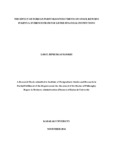| dc.contributor.author | KOSKEI, LOICE JEPKURGAT | |
| dc.date.accessioned | 2020-02-03T08:36:52Z | |
| dc.date.available | 2020-02-03T08:36:52Z | |
| dc.date.issued | 2016-11 | |
| dc.identifier.uri | http://10.1.130.140:8080/xmlui/handle/123456789/304 | |
| dc.description | FULL TEXT | en_US |
| dc.description.abstract | The study focused on the effect of foreAigBnS TpoRrAtfoCliTo investments on stock returns of listed
financial institutions in Kenya. Reversals of FPIs due to a shift in investor risk appetite may
have a drastic impact on the value of shares of financial institutions hence the effect on stock
returns. FPI instability complicates the financial performance of financial institutions hence
its stock returns. Uncertainties in the flow of FPI may result in unpredictable behaviour of
stock returns in Kenya’s economy and also at the firm level. These inflows can also cause
domestic currency appreciation if they are significant enough and thereby causing a mismatch
in assets and liabilities of financial institutions. The net effect of this is the possibility of
financial loss suffered by the financial institutions. The returns and general financial
performance of financial institutions are affected if bank loans were used to finance foreign
transactions. The objective of this study was to investigate the effect of foreign portfolio
investments on stock returns of listed financial institutions in Kenya. The target population of
the study was 21 financial institutions listed on the Nairobi Securities Exchange Limited. The
study used purposive sampling technique and concentrated on 14 financial institutions listed
on the Nairobi Securities Exchange Limited. Secondary data was obtained from Central Bank
of Kenya, Nairobi Securities Exchange Limited and Capital Markets Authority. The study
focused on monthly datasets of foreign portfolio equity sales, foreign portfolio equity
purchases, foreign portfolio equity turnover, exchange rate changes and stock returns
undertaken by foreign investors in Kenya’s listed financial institutions since January 2008 to
December 2014. This study adopted a causal research design as it seeks to tests for the
existence of cause-and-effect relationships among variables. The study adopted a panel data
regression using the Ordinary Least Squares (OLS) method where the data included time
series and cross-sectional data that is pooled into a panel data set and estimated using panel
data regression. Hausman test was carried out to determine whether to use random effects or
fixed effects regression model and findings indicated that random effects model was
preferable for this study. Results from panel estimation showed that exchange rate risk affect
stock returns of listed financial institutions in Kenya. The findings from the study would be
useful to the policy makers and regulators in making informed decisions and formulating
policies that would indeed contribute to effective management of foreign portfolio
investments in Kenya. The study concluded that financial institutions should device ways of
attracting foreign portfolio equity inflows as they improve the liquidity position of these
firms and hence increasing the returns. The study recommended that policies that would
attract foreign portfolio investment should be pursued in order to enhance stock returns and
that the government through Capital Markets Authority should enhance development of
corporate bond market. | en_US |
| dc.language.iso | en | en_US |
| dc.publisher | KABARAK UNIVERSITY | en_US |
| dc.subject | Foreign portfolio investments, financial institutions, stock returns, exchange rate risk, Nairobi stock exchange. | en_US |
| dc.title | THE EFFECT OF FOREIGN PORTFOLIO INVESTMENTS ON STOCK RETURNS IN KENYA: EVIDENCE FROM NSE LISTED FINANCIAL INSTITUTIONS | en_US |
| dc.type | Thesis | en_US |

